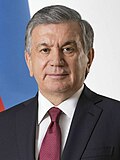 |
|---|
| Government |
Below is the list of leaders of Uzbekistan since the establishment of Uzbek SSR in 1924.
 |
|---|
| Government |
Below is the list of leaders of Uzbekistan since the establishment of Uzbek SSR in 1924.
| No. | Portrait | Name (birth-death) | Term of office | Political party | |
|---|---|---|---|---|---|
| Took office | Left office | ||||
| 1 |  | Vladimir Ivanov (1893–1938) | 12 February 1925 | 21 September 1927 | OʻzKP/CPSU |
| 2 |  | Kuprian Kirkizh (1886–1932) | 21 September 1927 | April 1929 | OʻzKP/CPSU |
| 3 |  | Nikolay Gikalo (1897–1938) | April 1929 | June 1929 | OʻzKP/CPSU |
| 4 |  | Isaak Zelensky (1890–1938) | June 1929 | December 1929 | OʻzKP/CPSU |
| 5 |  | Akmal Ikramov (1898–1938) | December 1929 | 21 September 1937 | OʻzKP/CPSU |
| 6 | Pyotr Yakovlev | 21 September 1937 | 27 September 1937 | OʻzKP/CPSU | |
| 7 |  | Usman Yusupov (1901–1966) | 27 September 1937 | 7 April 1950 | OʻzKP/CPSU |
| 8 | Amin Niyazov (1903–1973) | 7 April 1950 | 22 December 1955 | OʻzKP/CPSU | |
| 9 | Nuritdin Mukhitdinov (1917–2008) | 22 December 1955 | 28 December 1957 | OʻzKP/CPSU | |
| 10 | Sobir Kamolov (1910–1990) | 28 December 1957 | 15 March 1959 | OʻzKP/CPSU | |
| 11 |  | Sharof Rashidov (1917–1983) | 15 March 1959 | 31 October 1983 | OʻzKP/CPSU |
| 12 |  | Inomjon Usmonxoʻjayev (1930–2017) | 31 October 1983 | 12 January 1988 | OʻzKP/CPSU |
| 13 | Rafiq Nishonov (1926–2023) | 12 January 1988 | 23 June 1989 | OʻzKP/CPSU | |
| 14 |  | Islam Karimov (1938–2016) | 23 June 1989 | 31 August 1991 | OʻzKP/CPSU |
T Term extension referendum
C Constitutional referendum
† Died in office
| No. | Portrait | Name (Birth–Death) | Elected | Term of office | Political party | ||
|---|---|---|---|---|---|---|---|
| Took office | Left office | Time in office | |||||
 | Islam Karimov (1938–2016) [1] | 1990 | 24 March 1990 | 2 September 2016 [†] | 26 years, 162 days | OʻzKP (until Nov.1991) | |
| 1 | 1991 1995 [T] 2000 2002 [C] | XDP (until 2006) | |||||
| 2007 2015 | OʻzLiDeP | ||||||
| — |  | Nigmatilla Yuldashev [2] (1962–) Acting president | — | 2 September 2016 | 8 September 2016 | 6 days | OʻzMTDP [3] |
| — |  | Shavkat Mirziyoyev [4] (1957–) | — | 8 September 2016 | 14 December 2016 | 97 days | OʻzMTDP (until Dec. 2016) |
| 2 | 2016 2021 | 14 December 2016 | Incumbent | 8 years, 248 days | OʻzLiDeP (until 2023) | ||
| 2023 | Independent | ||||||
| Rank | President | Time in office | |
|---|---|---|---|
| 1 | Islam Karimov | 25 years, 1 day [5] | |
| 2 | Shavkat Mirziyoyev | 8 years, 248 days | 8 years, 345 days |
| — | 97 days (Acting) | ||
| — | Nigmatilla Yuldashev | 6 days (Acting) | |
